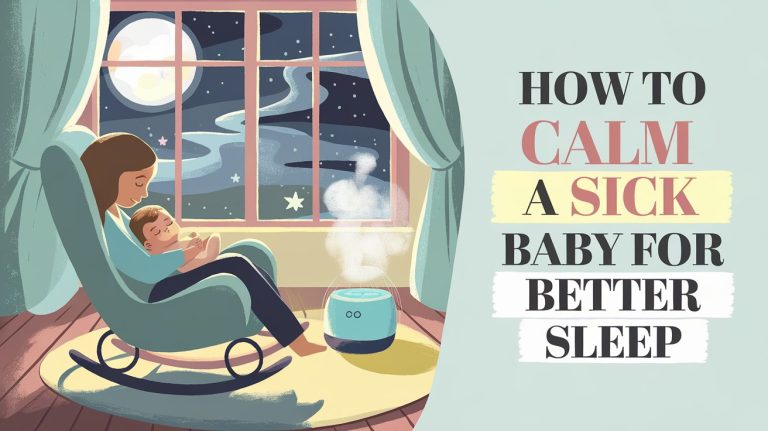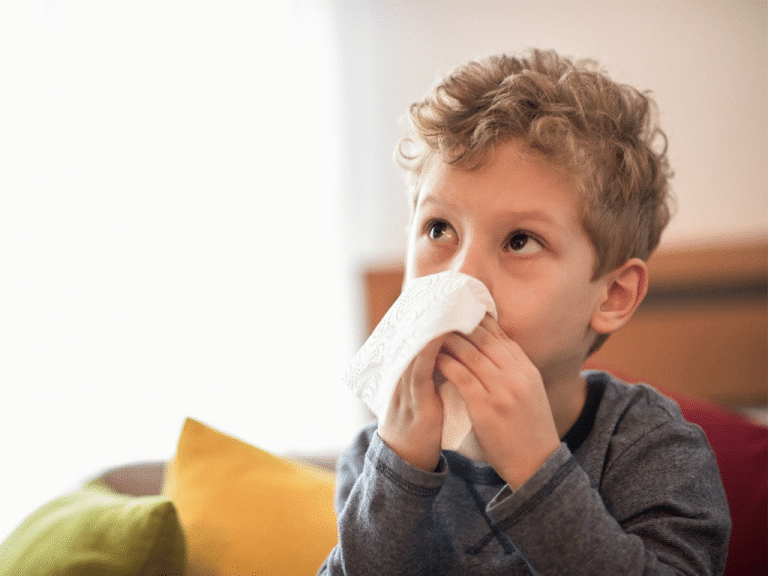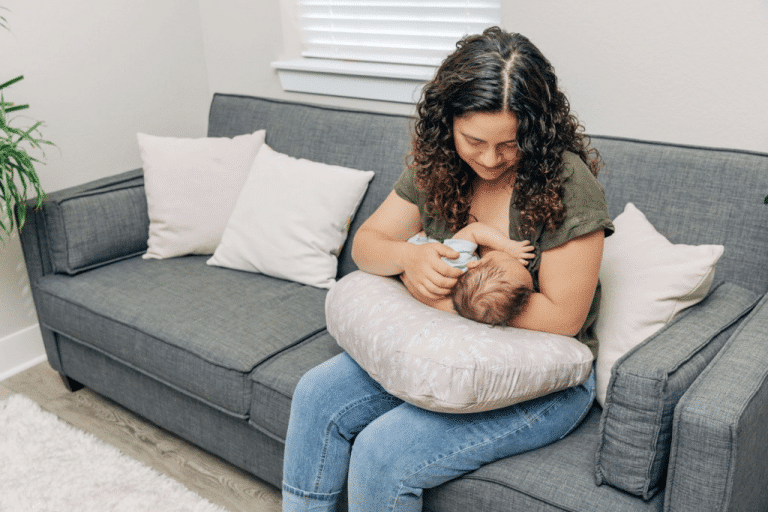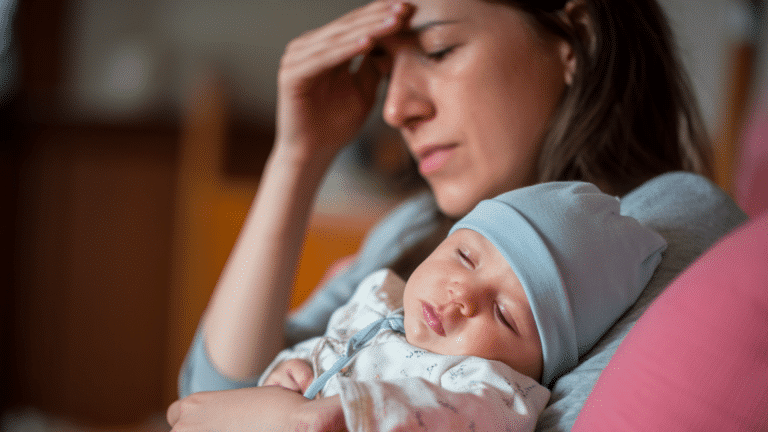Can a sick baby get good sleep? Most parents face long nights watching their little ones toss and turn when illness strikes.
A stuffy nose, fever, or cough can leave both babies and parents exhausted and frustrated.
But here’s good news for tired parents: simple techniques can help sick babies sleep better.
Medical experts have found that small changes to a baby’s sleep setup and routine can make a big difference during illness.
This guide shows parents the most helpful ways to comfort their sick little ones and help them get the rest they need to feel better.
Importance of Sleep in Helping Your Sick Baby Heal
When babies get sick, sleep becomes their body’s best helper.
A baby’s immune system works extra hard during sleep to fight off illness. Parents often notice their sick babies sleep more than usual – this is the body’s natural way of getting better.
Medical research tells us why sleep matters so much when babies are sick:
- Sleep helps the body create proteins called antibodies that fight germs and infections
- The brain clears out harmful substances during deep sleep phases
- Growth hormones released during sleep aid in tissue repair and healing
- Rest keeps the baby’s temperature steady, which helps fight fever
Getting enough sleep can cut down the time a baby stays sick. A well-rested baby feels less cranky and eats better, which gives the body the energy it needs to get healthy again.
Each age needs different amounts of sleep when sick.
For example, newborns might sleep up to 20 hours, while older babies need 14-16 hours spread across day and night. This extra sleep time lets their little bodies focus on getting better.
Recognizing When Your Baby Is Unwell
Parents often feel worried when their baby seems unwell. Being alert to these signs helps them know when to call the doctor.
- A temperature above 100.4°F (38°C).
- Changes in feeding – refusing milk or eating much less than usual
- Crying that sounds different or weaker than normal
- Very sleepy or hard to wake up during normal feeding times
- Less wet diapers than usual (fewer than 4-6 in 24 hours)
- Breathing faster than usual or trouble breathing
- Skin looks pale, gray, or bluish around the lips
- Not moving their arms and legs as much as usual
- Rash that doesn’t fade when pressed with a glass
- Being more fussy or irritable than normal for over 4 hours
Ways to Help Your Baby Sleep Better When Sick
When illness keeps babies awake, parents need practical solutions that work.
Here are proven methods that help sick babies find comfort and rest through the night.
Method 1: Creating a Sleep-Ready Space
- Keep the room slightly cool (between 68-72°F) for better breathing
- Use a small humidifier to add moisture to the air, which helps clear stuffy noses
- Remove extra toys and items from the crib to prevent distractions
- Make sure the room is dark, using only a dim night light if needed
- Place a towel under one end of the mattress to create a slight angle that helps with congestion
Method 2: Comfort Through Touch
- Give gentle back rubs in circular motions to help your baby relax
- Hold your baby upright after feeding for 10-15 minutes
- Try skin-to-skin contact while sitting in a comfortable chair
- Use soft patting motions on their back to ease coughing
Method 3: Soothing Sounds and Music
- Play white noise that mimics the sound of the womb
- Use soft lullabies at a low volume
- Keep a steady shushing sound near their ear while holding them
- Try nature sounds like gentle rain or ocean waves
- Maintain these sounds at a consistent volume all night
Method 4: Feeding Tips for Nighttime
- Offer smaller, more frequent feeds to prevent tummy discomfort
- Keep feeds upright to help with congestion
- Try feeding in a steamy bathroom to help clear airways
- Watch for signs of fullness rather than sticking to strict schedules
Method 5: Comforting Bath Time Tips
- Give a warm bath before bedtime to help reduce fever and relax muscles
- Add a few drops of baby-safe lavender bath liquid for extra comfort
- Keep bath time short – about 5-10 minutes to prevent overtiring
- Pat dry gently and move quickly into warm pajamas
Method 6: Baby Massage Methods
- Use gentle strokes on legs and arms, moving toward the heart
- Try light tummy circles in a clockwise direction to help with gas
- Massage the bottom of the feet with soft pressure
- Include light shoulder and neck touches if the baby enjoys it
Method 7: Temperature Control
- Check temperature every 4 hours during the night
- Use light layers that can be easily added or removed
- Keep a thin blanket nearby for quick temperature adjustments
- Watch for signs of being too hot or cold, like a sweaty neck or cold hands
- Choose breathable cotton clothing for comfort
Method 8: Try Position Changes
- Switch sides every few hours if the baby has congestion
- Use rolled towels to prop up the mattress head safely
- Try holding upright on your chest while in a reclined position
- Consider wearing the baby in a safe carrier for daytime naps
Building the Perfect Bedtime Routine for A Sick Baby
Getting a sick baby to sleep needs a careful plan. The right bedtime routine helps babies know it’s time to rest, even when they don’t feel their best.
Start Early and Stay Steady:
A good nighttime routine should begin 30 minutes before bedtime.
This gives babies time to wind down slowly. Parents should dim the lights and lower the noise in the house.
Each step of the routine needs to flow smoothly into the next. When babies are sick, they need these familiar patterns even more than usual.
Keep Things Simple:
During illness, the bedtime routine should be shorter than normal. Too many steps might tire the baby more.
A basic plan works best – a warm bath, fresh diaper, cozy pajamas, and a quiet feeding session make up the perfect simple routine.
Parents should watch their baby’s tired signs and adjust the routine’s length as needed.
Stick to the Order:
The order of bedtime activities matters more than their timing. Doing things in the same order each night helps babies feel safe and know what comes next.
This might mean a bath, then massage, then a story, then feeding. When babies are sick, this familiar order brings comfort, even if the timing shifts a bit.
Make Room for Extra Care:
Sick babies often need more attention at bedtime. Parents can add quick health checks into the routine.
This includes checking temperature, giving medicine if needed, or using a nose suction tool.
These should fit naturally between the usual bedtime steps without disrupting the flow.
Keeping Your Baby Nourished and Hydrated While Sick
When babies feel sick, they might not want to eat or drink. But keeping them well-fed and hydrated is key to helping them get better.
Here’s what parents need to know about feeding during illness.
- Offer breast milk or formula in smaller amounts but more often – every 1-2 hours if needed.
- Watch for at least 6-8 wet diapers daily to ensure good hydration
- Try feeding when the baby is upright to make swallowing easier
- Use a slow-flow nipple if the regular one seems too fast during illness
- Feed before congestion gets worse – usually early morning and after naps
- Take breaks during feeds to help babies catch their breath
- Keep track of feeding times and amounts in a simple notebook
- Look for subtle hunger cues like putting hands to mouth or making soft sounds
Conclusion
Taking care of a sick baby requires patience, attention, and the right knowledge.
Parents now have simple, tested ways to help their little ones rest better during illness.
From creating the right sleep environment to knowing when to call the doctor, these methods can make nighttime easier for both babies and parents.
Remember, each baby responds differently to comfort methods.
Parents should try various approaches to find what works best for their little ones. The key is to stay calm and consistent with the chosen routine.
Is your baby having trouble sleeping while sick? Try these methods tonight, and keep track of what helps most.











